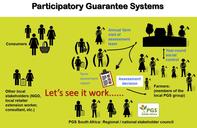The current worldwide food and financial crisis has demonstrated the inability of the chemical model of agriculture to alleviate hunger and poverty.

The chemical industrial model of agriculture contributes to global warming and the destruction of our biodiversity and natural resources such as water and soil. Furthermore, this form of monoculture (the planting of a single crop) also resulted in the destruction of traditional or indigenous methods of agriculture.
A resistance movement is growing in the world – ‘agro-ecological agriculture’ is proposed and implemented as an alternative to the use of chemical agents.
The goal is also to empower farmers to manage their natural resources and thus manage the environment in a sustainable way. Organic farming has, however, taken a form where certification along with a premium for the cultivation of products is the key considerations. This form of “organic” farming moves to the industrial model of agriculture where profit is the main purpose.
Organic farming in South Africa is full of contradictions. One of the issues is the cost organic certification that contradicts the principles of agro-ecology and, in most cases, is too expensive for most small-scale farmers. Organisations in South Africa, India and Brazil look at alternatives such as the Participatory Guarantee System (PGS) where farmers themselves guarantee the organic nature of their products.
This system removes the expensive third-party certification system and places farmers centrally in the certification or warranty system. PGS is considered worldwide as an alternative to third party certification and is suitable for small scale producers.
Organic farming is therefore the production of plants and animals in harmony with nature without the use of harmful chemicals and by using natural resources for e.g. growth stimulants, pest control and soil improvement.
The result is organic products free of chemicals and hormones and with a higher vitamin content containing no genetically modified organisms (GMOs) - these are plants, animals or microbes that contain genes that have been altered or transmitted from other organisms or species.
Sourced by Surplus People Project (SPP)